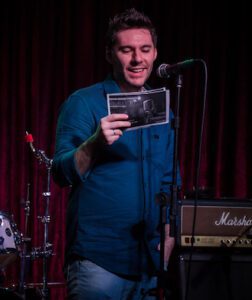So you heard from someone that you don’t have a good singing voice? No throat?
First of all, let’s clarify that the act of singing involves three processes:
- Listen well;
- Having a cerebral baggage that understands what you heard and that sends a precise command to the musculature involved in singing;
- Finally using the musculature to actually produce the voice.
I’m going to make an analogy to see if we can bring these concepts closer to our daily lives. My eyesight can aim at a 100 kg weight 2 meters away from me. My brain interprets that information and makes a rough blueprint of the process I would need to get out of my chair and lift that weight. My brain also sends commands to the body to finally get up from the chair, walk the 2 meters, bend down and lift the weight. But if my body is not trained to support this load, I will either not be able to or possibly harm myself in the act.
By hearing well, I don’t just mean having sound medically sound hearing. I also mean having an ear trained to differentiate nuances of notes and timbres. For example: listening to two 2 notes and even knowing nothing about music theory, knowing which one is the lowest. Or else, listening to 2 voices and identifying that one of them is more nasalized, etc.
Note that I made a point of mentioning that the person can have or develop this ability even if they don’t know anything about music theory. You yourself who read this post may be or know someone who has never studied music theory and who has this ability. But most people benefit from a formal study in this area, even if they already have some facility. As a musician, remember: your first instrument is your ear.
In addition to looking for classes with teachers, a tip is to try a self-study through the Ear Master software ( www.earmaster.com ). It is a very complete software that goes from very simple exercises to very complex levels of auditory training; in Brazil we also know this subject as Musical Perception. Another thing that can be done is, if you already play an instrument, try to play an excerpt of the melody of any song every week by ear.
With that, we’ve sorted out the first part of our brain baggage. The second part of knowledge is specifically related to vocal technique. That’s why a good singing class doesn’t have to be super theoretical, but it should have essential information so you can know what you’re doing with your own body.
Questions like what is it, where and how to use your chest voice, mixed voice, head voice; here I will use a little more pharyngeal resonance; need to use more airflow here; later in the song I need a bit more compression etc. All this must be answered and learned during your practical singing lessons. This is essential for you to send an accurate command to your body.
Finally comes the step of actually performing the act of singing. For this, you need to have trained a lot to have “strength”, resistance, consistency and muscular precision so that everything your body has processed in the previous steps goes according to plan.
After these steps, you already have all the necessary structural tools, leaving only questions related to interpretation and style. But that’s a subject for another post, stay tuned!
So, don’t fall for the idea that singing is all about having a good voice, having a throat, or that this is some talent or gift that only the “chosen people” can have. Science, medicine, phonoaudiology and vocal technique today are already very advanced and have a right and clear way for you to learn to sing well.



